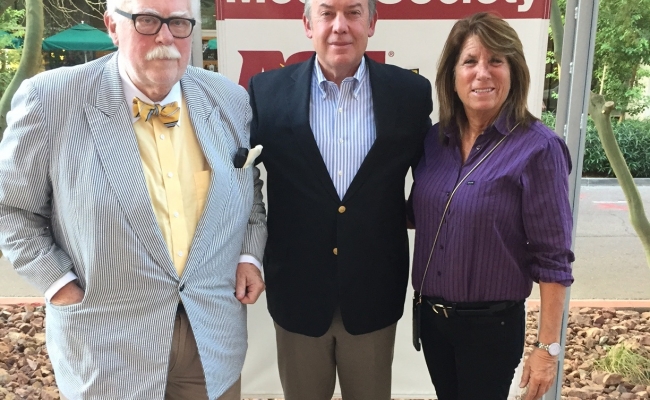Michael Crow, the visionary President of Arizona State University (ASU), invited a team from the USC Schwarzenegger Institute to visit Tempe to explore collaborations on policy areas of mutual interest, including climate change, energy, political reform and on-line education. The Schwarzenegger Institute team included Global Director Bonnie Reiss, Senior Advisor Kevin Starr and Institute Research Fellow Christian Grose.
The Institute's first brainstorming session was with the ASU team that runs the “Decision Theater Network,” an innovative tool which helps researchers and policy leaders visualize solutions to complex problems. The Decision Theater Network addresses cross-disciplinary local, national and international issues and provides the latest expertise in collaborative, computing and display technologies for data visualization, modeling, and simulation. The Institute was very impressed by the Decision Theater and will work with ASU to host national leaders in their D.C. decision theater on issues of clean energy. Additionally the Institute will look at bringing Southern California leaders to the Tempe Decision Theater to explore storm water capture policy and planning.
ASU is also a leader in utilizing online education to expand the reach of the education the school provides. Through its EdPlus platform ASU is pioneering the use of online programs to support low income high school students and incoming freshman as well as redesigning the student / teacher dynamic. They are also one of the first fully accredited universities to offer online degrees at both the graduate and undergraduate level to students from around the world.
Governor Schwarzenegger has been a long standing proponent of harnessing technology in the classroom to improve educational outcomes. When Institute Director Bonnie Reiss served as Secretary of Education she led the Governor’s Technology Education Initiative. The Schwarzenegger Institute continues to support innovation in the classroom and works with educators and technology experts to seek ways to encourage the growth of effective and impactful technology and online programs.
The final session at ASU focused on collaborating on political reform. Recently Arizona's voters passed a citizen redistricting initiative to end gerrymandering, similar to the one passed by California voters and supported by Governor Schwarzenegger. The Arizona initiative was constitutionally challenged in the courts and Governor Schwarzenegger joined other political reform leaders in filing an amicus brief with the U.S. Supreme Court. The Supreme Court ruled with the Arizona voters and the Institute and our political reform and good government partners celebrated the ruling.
The Institute remains committed to championing reform efforts and it was agreed that the Institute and ASU would look for future and ongoing collaborations. To that end, the ASU public policy team and political reform experts met with the USC Schwarzenegger team which included Professor Kevin Starr and Professor Christian Grose, a Schwarzenegger Research Fellow who has conducted extensive research on both redistricting and top-two open primaries. The ASU team was so impressed with Dr. Grose’s research that they invited him to speak at an upcoming conference on political reform and the independent voter.
The Institute will also host a symposium on December 2nd at USC that will examine the impact of the top-two primary on California's political system and candidate and voter behavior. Dr. Grose and academics from other leading universities will present their latest research at the event and senior political strategists advising Loretta Sanchez and Kamala Harris will discuss how California’s top-two reform, which produced a general election U.S. Senate race between two Democrats, changed their campaign strategy.

